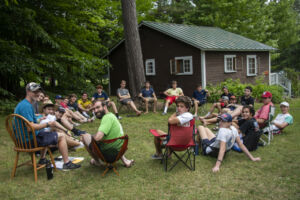Becoming a Kingswood counselor is a goal that some campers have from the day they set foot on the property. Other young men realize they are interested in the program when they are closer to sixteen. Some even come to Kingswood for the first time as a Counselor-in-Training (CIT). In any case, our CIT program is open to any sixteen year old interested in learning about being a counselor at Kingswood.

The CIT program is about more than just producing well-trained counselors; it is about helping these young men build skills that will help them be successful as they enter college and beyond. The CITs live in The Barn and attend meetings similar to training sessions attended by counselors.
The first question posed to CITs in one of our first meetings is, “What does it take to be a good Kingswood counselor?” The transition from camper to counselor can come with challenging moments that we aim to address in training sessions and with hands-on, supervised experiences. We have divided the CIT program into seven parts.
Part I: The Kingswood Philosophy
Meetings led by the directors and administrators will discuss what Kingswood holds dear. Annual commentaries from the directors serve as starting points for these conversations, which happen in the first few days of camp.
Part II: Kingswood Nuts and Bolts
CIT’s learn the highlights of “Policies and Procedures” and “Safety, Supervision & Professionalism” – two major topics of staff training and development.
Part III: Discipline
CIT’s learn effective disciplinary and conflict resolution strategies by discussing the philosophies and procedures of Jo Anne Nordling, a noted child psychologist and author of “Taking Charge.” CITs will then discuss appropriate responses in a number of Kingswood case studies.
Part IV: Cabin Assignments
Once we have a feel for what age group each CIT is comfortable with, he is assigned to a cabin for the remainder of the session. The cabin counselor observes and reports back to the CIT director and administration on each CIT’s ability to manage the cabin and how well they assert themselves in a positive manner.
Part V: Clinics
During the first two weeks, CITs are assigned to clinics that they are interested in leading during their final week at camp. At first, CITs observe and assist when needed. As a CIT gains confidence as a teacher and as the lead counselor deems appropriate, the CITs are asked to take on additional responsibility. CITs write a 5-day clinic and submit it for approval. During the final week, the CITs lead the clinic and are observed by a “master counselor,” who provides constructive feedback to the CIT and to the administration.
Part VI: Work Ethic
How CITs approach their “work” assignments reveals a lot about their character. Most CITs work in the kitchen, however alternatives such as maintenance and facility work will be considered. All CITs are encouraged to participate in the Lake Host Program, where they inform boaters at the public boat launch about invasive species and examine watercraft for any suspicious particles. We often sign off on community service hours for CITs for their time spent as Lake Hosts.
Part VII: Summary
Each CIT meets with the CIT director and camp directors for a final evaluation during the last days of the session. It is at this final meeting where we discuss the progress a CIT has made. CITs who successfully complete the training are asked to submit an application over the winter.






